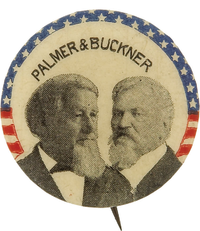Gold Democrat
|
National Democratic Party
|
|
|---|---|

Palmer/Buckner campaign button (1896)
|
|
| Leaders |
John M. Palmer, Grover Cleveland, Simon B. Buckner |
| Founded | 1896 |
| Dissolved | 1900 |
| Preceded by | Bourbon Democrats (faction) |
| Merged into | Democratic Party |
| Ideology |
Gold standard Progressivism Classical liberalism |
| Political position | Centre-right |
| National affiliation | Democratic Party |
The National Democratic Party or Gold Democrats was a short-lived political party of Bourbon Democrats, who opposed the regular party nominee William Jennings Bryan in 1896. Most members were admirers of Grover Cleveland. They considered Bryan a dangerous man and charged that his "free silver" proposals would devastate the economy. They nominated the Democratic politicians John M. Palmer, a former Republican governor of Illinois and Union general, and Simon Bolivar Buckner, Sr., a former governor of Kentucky and Confederate general, for President and Vice President, respectively. They also ran a few candidates for Congress and other offices, including William Breckinridge in Kentucky.
The founders were disenchanted Democrats who saw the organization of the new party as a means to preserve the ideals of Thomas Jefferson and Grover Cleveland. In its first official statement, the executive committee of the party accused the Democratic Party of forsaking this tradition by nominating Bryan.
For more than a century, it declared, the Democrats had believed "in the ability of every individual, unassisted, if unfettered by law, to achieve his own happiness" and had upheld his "right and opportunity peaceably to pursue whatever course of conduct he would, provided such conduct deprived no other individual of the equal enjoyment of the same right and opportunity. [They] stood for freedom of speech, freedom of conscience, freedom of trade, and freedom of contract, all of which are implied by the century-old battle-cry of the Democratic party, 'Individual Liberty'". The party criticized both the inflationist policies of the Democrats and the protectionism of the Republicans.
...
Wikipedia
